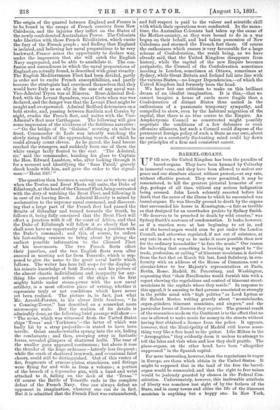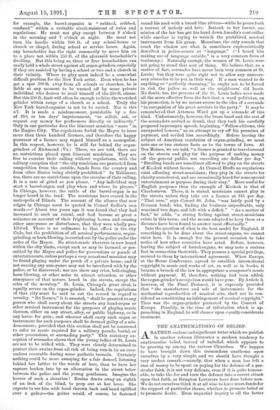BARREL-ORGANS.
-UP till now, the United Kingdom has been the paradise of barrel-organs. They have been hymned by Calverley in immortal verse, and they have been allowed to molest our peace and our slumbers almost without protest,—at any rate, without effective protest. They were permitted, it may be remembered, to kill the greatest pictorial humorist of our day, perhaps of all time, without any serious indignation being aroused. John Leech solemnly asserted before his death that the cause of the illness to which he succumbed was barrel-organs. He was literally ground to death by the organs that surrounded his house in Kensington,—a fate as terrible as that designed for an unorthodox prelate by Sydney Smith. "He deserves to be preached to death by wild curates," was Sydney Smith's sentence of condemnation. It looks, however, as if a reaction were at last beginning to set in, and as if the barrel-organ would soon be put under the London Council, and otherwise regulated, if not out of existence, at any rate in such a way as to make it more possible than now for the ordinary householder "to face the music." Our reason for believing that something is brewing in regard to "the trade, profession, or calling" of itinerant musicians, is derived from the fact that on March 9th last, Lord Salisbury, in con- formity with an address of the House of Commons, sent a circular-letter to her Majesty's representatives at Paris, Berlin, Rome, Madrid, St. Petersburg, and Washington, requesting that "their Excellencies would furnish him with a report showing the regulations and control of itinerant street- musicians in the capitals where they reside." In response to this appeal, it is amusing to find persons associated so strongly in the public mind with "high politics" as Lord Lytton or Sir Robert Morier, writing gravely about "mountebanks, organ-grinders, itinerant musicians, and singers," and the particular forms of licences they require. The general result of the researches made on the Continent is to the effect that no one is allowed to make music for money in the streets without having first obtained a licence from the police. It appears, however, that the Municipality of Madrid still leaves some- thing very like a free hand to the guitar. Like Milton in the " Areopagitica," they evidently deem it useless to attempt to tell the lutes and viols when and how they shall prattle. The piano-organs, on the other hand, have been "altogether suppressed" in the Spanish capital.
Far more interesting, however, than the regulations in vogue in Europe, are those which obtain in the -United States. It might be supposed that in the land of the free the barrel- organ would be unmuzzled, and that the right to free noises
would be jealously guarded by clauses in the Federal Con-
stitution. -Unfortunately, however, this inalienable attribute of liberty was somehow lost sight of by the fathers of the
State, and in many towns and cities the life of the itinerant musician is anything but a happy one. In New York,
for example, the barrel-organist is " cabined, cribbed, confined" within a veritable strait-waistcoat of rules and regulations. He must not play except between 9 o'clock in the morning and 7 o'clock at night. He must not turn his handle within 500 ft. of any school-house or church or chapel, during school or service hours. Again, any householder has the right summarily to move him on to a place not within 250 ft. of the aforesaid householder's dwelling. But this being so, three or four householders can easily hold a whole street against all organ-grinders, especially if they are assisted by having a school or two and a church in their vicinity. Where to play must indeed be a somewhat difficult problem for the New York artist. Even when he has got a spot 500 ft. away from all schools or churches, he is liable at any moment to be warned off by some private individual who desires to avail himself of the 250 ft. clause. But this 250 ft. limit will often be enough to drive the wretched grinder within range of a church or a school. Truly the New York barrel-organist is not to be envied. Nor is this all. It is made a misdemeanour, punishable by a fine of $10, or ten days' imprisonment, "to solicit, ask, or request any money for performers directly or indirectly." Only in one particular does the itinerant musician " score " in the Empire City. The regulations forbid the Mayor to issue more than three hundred licences, and therefore the happy possessor of a licence may regard himself as a monopolist. In this respect, however, he is still far behind the organ- grinders of Richmond (Va.) There, we are told, there are no restrictions placed upon itinerant musicians. They are free to exercise their calling without regulations, with the solitary exception that "the city musicians are protected from competition from the outside, bands from the country and from other States being strictly prohibited." In Baltimore, too, there are no restrictions upon the exercise of their calling. It is a case of grind as you please. "Any individual may start a barrel-organ, and play when and where he pleases." In Chicago, however, the rattle of the barrel-organ is no longer heard in the land. The musicians have ceased in the metropolis of Illinois. The account of the silence that now reigns in Chicago must be quoted in Consul Sadler's own words :—" About two years ago it was found that they had increased to such an extent, and had become so great a nuisance on account of their frightening horses and causing other annoyance or disturbance, that they were wholly pro- hibited. There is no ordinance to that effect in the city Code, but the prohibition of all musical performances, organ- grinding, or horn-blowing, is carried out by the police under the order of the Mayor. No street-music whatever is now heard within the city limits, except such as may be licensed or per- mitted by the Mayor and police for processions or parade of entertainments, unless perhaps a very occasional musician may be found playing under the porch of a private house, and if not causing any annoyance may not be interfered with by the police, or be discovered ; nor are there any cries, bell-ringing, horn-blowing, or other noise to attract attention, or other annoyance of that nature, heard in the streets, except the cries of the newsboy." St. Louis, Chicago's great rival, is equally severe on the organ-grinder. Indeed, the regulations of that city must be said to cut the record in regard to severity. "No licence," it is enacted, "shall be granted to any person who shall carry about the streets any hand-organ or other musical instrument for the purposes of playing music thereon, either on any street, alley, or public highway, or in any house for gain ; and whoever shall carry such organ or instrument for such purposes shall be deemed guilty of a mis- demeanour; provided that this section shall not be construed to refer to music required for a military parade, burial, or other processions, or serenading party." This statutory ex- ception of serenades shows that the young ladies of St. Louis are not to be trifled with. They were clearly determined to protect their swains from all risk of being run-in by an over- zealous constable during some pathetic tremolo. Certainly nothing could be more annoying for a fair damsel, listening behind her lattice to the words of love, than to have her rapture broken into by an altercation in the street below between the police and the young gentleman. Imagine the horror of such a situation I Rosina draws away an eighth of an inch of the blind, to peep out at her lover. She expects to see him with head thrown back and hand uplifted over a guitar—the guitar would, of course, be fastened round his neck with a broad blue ribbon—while he pours forth a torrent of melody and love. Instead, to her horror, one minion of the law has got his hand down Amadis's coat-collar, while another is trying to wrench the prohibited musical instrument from his grasp. Meantime, the only sounds that reach the window are what is sometimes euphemistically described in police-courts as "language." ("I heard him making use of language outside," is a very common form of testimony.) Naturally enough, the women of St. Louis were not going to stand that sort of thing. We believe that, as a matter of fact, serenades have never been very common at St. Louis; but they were quite right not to allow any unneces- sary obstacles to be put in their way. If a man wanted to do anything so "perfectly charming," he ought not to be forced to risk the police as well as the neighbours' old boots. No doubt, too, the protests of the St. Louis ladies were made all the more effective from the fact that a ward politician, on his promotion, is by no means averse to the idea of a serenade "in recognition of his great services to the party." It may be remembered that Artemus Ward got up a serenade of this kind. Unfortunately, however, the brass-band and the rest of the serenaders arrived so drank, that they took his carefully prepared impromptu speech, beginning, "Fellow-citizens, this unexpected honour," as an attempt to cry off his promises of payment, and reviled him accordingly. Before leaving the subject of American regulation of organ-grinding, we must note one or two curious facts as to the towns of Iowa. At Des Moines, we are told, "a licence is granted to travel around on the streets and play for the purpose of making money off the general public, not exceeding one dollar per day." "Strolling bands are sometimes allowed to play on the streets of Keokuk without licence. At Council Bluffs no regulations exist affecting street-musicians ; they play in the streets for charity unmolested, and are occasionally hired for some special - entertainment or purpose during their stay." More useful for English purposes than the example of Keokuk is that of Charlestown. There, it is stated, musicians cannot play in the streets unless they take out a licence at $15 per day. "That sum," says Consul St. John, "was lately paid by a German band ; who, finding the business unprofitable, only remained two days, and left with a deficit." "As a matter of fact," he adds, "a strong feeling against street-musicians exists in this town; and the means adopted to keep them at a distance have been found to answer most effectually."
Into the question of what is the best model for England, if something is to be done about the street-organs, we cannot enter here. It is enough for the present occasion to take notice of how other countries have acted. Before, however, leaving the subject of barrel-organs, we may note a curious fact in connection therewith. They possess a special privilege, secured to them by international agreement. When Europe, at the Berne Conference, agreed to establish international copyright in music and works of art, as well as in books, it became a breach of the law to appropriate a composer's music without payment. If, therefore, nothing had been added, the organ-grinder's occupation would have gone. By Article 3, however, of the Final Protocol, it is expressly provided that "the manufacture and sale of instruments for the mechanical reproduction of musical airs, shall not be con- sidered as constituting an infringement of musical copyright." Thus was the organ-grinder protected by the Concert of Europe. Possibly, in the time of tribulation which is ap- proaching in England, he will chance upon equally considerate treatment.



































 Previous page
Previous page